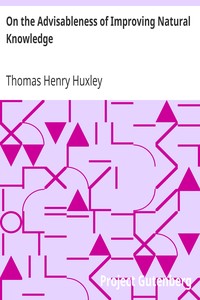On the Advisableness of Improving Natural Knowledge by Thomas Henry Huxley
"On the Advisableness of Improving Natural Knowledge" by Thomas Henry Huxley is a philosophical discourse published in the mid-19th century, specifically during the Victorian era. This book serves as a lay sermon where Huxley expounds on the significance of advancing natural knowledge and understanding. It tackles the interplay between human intellect and nature, emphasizing the need for empirical reasoning and scientific inquiry as a means to mitigate societal calamities such as plagues
and fires that plagued cities like London in earlier epochs. In this thought-provoking text, Huxley reflects on historical events such as the Great Plague and the Great Fire of London, illustrating how ignorance and lack of scientific understanding exacerbated these crises. He argues that the improvement of natural knowledge is vital not only for practical advancements and solving material problems but also for reshaping moral and intellectual frameworks. The book elucidates how scientific progress has instigated significant philosophical shifts, fostering skepticism towards blind faith and authority while promoting empirical verification as a cornerstone of true understanding. Ultimately, Huxley advocates for a continuous pursuit of knowledge, viewing it as essential for the betterment of humanity and societal resilience. (This is an automatically generated summary.)
Read or download for free
| How to read | Url | Size | |||
|---|---|---|---|---|---|
| Read now! | https://www.gutenberg.org/ebooks/2934.html.images | 62 kB | |||
| EPUB3 (E-readers incl. Send-to-Kindle) | https://www.gutenberg.org/ebooks/2934.epub3.images | 118 kB | |||
| EPUB (older E-readers) | https://www.gutenberg.org/ebooks/2934.epub.images | 117 kB | |||
| EPUB (no images, older E-readers) | https://www.gutenberg.org/ebooks/2934.epub.noimages | 82 kB | |||
| Kindle | https://www.gutenberg.org/ebooks/2934.kf8.images | 293 kB | |||
| older Kindles | https://www.gutenberg.org/ebooks/2934.kindle.images | 286 kB | |||
| Plain Text UTF-8 | https://www.gutenberg.org/ebooks/2934.txt.utf-8 | 52 kB | |||
| Download HTML (zip) | https://www.gutenberg.org/cache/epub/2934/pg2934-h.zip | 117 kB | |||
| There may be more files related to this item. | |||||
Similar Books
About this eBook
| Author | Huxley, Thomas Henry, 1825-1895 |
|---|---|
| Title | On the Advisableness of Improving Natural Knowledge |
| Credits | Produced by Amy E. Zelmer, and David Widger |
| Reading Level | Reading ease score: 36.3 (College-level). Difficult to read. |
| Language | English |
| LoC Class | Q: Science |
| Subject | Science |
| Category | Text |
| EBook-No. | 2934 |
| Release Date | Nov 1, 2001 |
| Most Recently Updated | Jan 22, 2013 |
| Copyright Status | Public domain in the USA. |
| Downloads | 205 downloads in the last 30 days. |
| Project Gutenberg eBooks are always free! | |

